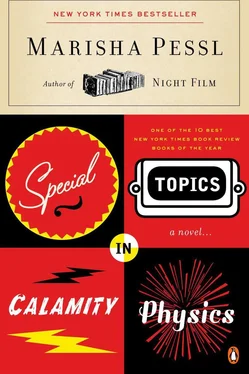I rubbed my eyes after scribbling this last bit into my CASE NOTES (now occupying twelve pages of a college-ruled legal pad), threw down my pen and pressed my head into the back of Dad’s office chair. The house was quiet. In the lone window by the ceiling, darkness clung like a flimsy nightgown. The wood-paneled wall, where my mother’s six cases of butterflies and moths had once hung, stared back at me, expressionless.
Remembering old Smoke Harvey, shadowing him through the costume party, his Long Night’s Journey into Death — it rained all over the parade of secret revolution against corporate greed.
That was the problem with causes, the cheap toy within their Happy Meal; inevitably, there came a point when they looked exactly like their enemy, when they became what they fought so hard against. Freedom, Democracy — the big breathy words people shouted with their fists in the air (or else whispered, wimpy looks in their eyes) — they were beautiful mail-order brides from far-flung countries, and no matter how long you insisted they stick around, when you actually took a good look at them (when you stopped feeling woozy in their presence), you noticed they never actually fit in; they barely learned the customs or language. Their transplant from a textbook into the real world was slipshod, rickety at best.
“Just as no imposing character in a book may be cleverer than its minuscule author,” Dad remarked in his lecture “Landlocked Switzerland: They’re Nice and Neutral Only Because They’re Tiny,” “no government can be greater than its governors. And provided we’re not invaded by Little Green Men anytime soon — reading a week’s worth of The New York Times , I’m not so sure that’d be a bad thing — these governors will always be mere humans, men and women, cute little paradoxes, forever capable of astounding compassion, forever capable of astounding cruelty. You’d be surprised — Communism, Capitalism, Socialism, Totalitarianism — whatever ism it happens to be doesn’t matter all that much; there will always be the tricky balance between the human extremes. And so we live our lives, make informed choices about what we believe in, stand by them. That’s all.”
It was 9:12 P.M. and Dad still wasn’t home.
I turned off his computer, returned the copy of Federal Forum and the other books to the bookshelf. Gathering together my notes, I switched off the study lights and hurried upstairs to my room. I threw the papers on my desk, took a black sweater out of my closet and pulled it over my head.
I was going back to Hannah’s. And I had to go, not tomorrow, not in the bleaching daylight that killed everything, made it laughable, but now , while the truth was still squirming. I wasn’t finished. I couldn’t tell anyone about my theory now. No, I needed something else, physical evidence, facts, papers — Minipress in one of those nineteen prescription bottles, a photograph of Hannah and George Gracey hand in hand or an article from The Vallarmo Daily , “Policeman Shot, Woman Escapes,” dated September 20, 1987—something, any thing that would handcuff Hannah Schneider to Catherine Baker to Smoke Harvey to The Nightwatchmen. I believed it, of course. I knew Hannah Schneider was Catherine as surely as I knew a turtle could weigh a thousand pounds (see “Leatherback Turtle,” Encyclopedia of Living Things , 4th ed.). I’d been with her in her living room and on the mountaintop, painstakingly collected those splinters of her Life Story she’d scattered on the ground. I’d always suspected something beautiful and grotesque lived in her shadows, and now, finally, here it was, shyly inching out of the gloom.
But who’d believe me? Lately, my average of persuading others of my beliefs was around zero for eight. (I’d make an appalling missionary.) The Bluebloods thought I’d killed Hannah, Detective Harper thought I had Witness Traumatization and Dad seemed to be deathly afraid I was soft-shoeing into madness. No, the rest of the world, including Dad, needed proof to believe in something (it was a crisis the Catholic Church faced with its rapidly diminishing numbers) and not the kind of proof that was a faint shadow darting through a doorway, a hiccup on the stairs, but proof like a stout Russian schoolmarm standing directly under a floodlight (and unwilling to budge): three chins, frantic gray hair (barely pacified by bobby pins), a big orange skirt (under which an adult orangutan could hide fully undetected) and a pince-nez.
I’d find this proof if it killed me.
As soon as I finished tying my shoes, however, I heard the Volvo cruising into the driveway — a snag in my plan. Dad would never let me go to Hannah’s now, and by the time I’d explained everything, fielded every one of his tenacious, sticky questions (trying to convince Dad of something new, one had to be outfitted like God in Genesis), the sun would be rising and I’d feel as if I’d just fought off a Giant Squid. (I’ll admit, too, even though I felt I’d proved it satisfactorily, I was nevertheless afraid that, unlike the Boltzmann Constant, Avogadro’s Number, Quantum Field Theory, Cosmic Inflation, my feeble premise could very well collapse within twenty-four hours. I had to get moving.)
I heard Dad enter the front door, chuck his keys onto the table. He was humming “I Got Rhythm.”
“Sweet?”
Wildly, my eyes veered around the room. I ran to a window, unlatched it, heaved the thing up with all my might (it hadn’t been opened since the Carter Administration), then the rusty screen. I stuck my head out, looked down. Unlike a clammy family drama on network television, there was no mighty oak with ladderlike branches, no lattice, rose-garden grill or well-situated fencing — only a three-story drop, a sloping ledge above the bay window in the dining room and a few feeble strands of ivy clinging like hair to a sweater.
Dad was playing messages on the answering machine, his own, about dinner with Arnie Sanderson, then Arnold Schmidt of The New Seattle Journal for Foreign Policy, who spoke with a lisp and slurred the last four digits of his phone number.
“Sweet, you upstairs? I brought home some food from the restaurant.”
Hastily, I slipped on my backpack, swung one leg out the window, then the other, awkwardly sliding onto my elbows. I dangled there for a minute, staring down at the shrubs far under my feet, noting I could very well die, at the very least, break both arms and legs, maybe even my back, end up a paraplegic— then what sort of crimes would I be able to solve, which of Life’s Great Questions would I ever answer? It was a moment I was supposed to wonder if It Was Worth It, and so I did: I wondered about Hannah and Catherine Baker and George Gracey. I pictured Gracey in Paxos, tan as rawhide holding a margarita by an infinity pool, the ocean jaded in the distance, skinny girls fanning out on either side of him like celery sticks on a dip tray. How faraway Jade and Milton had become, and St. Gallway, even Hannah — her face was already receding like a set of history dates I’d crammed into my head for a Unit Test. How lonely and absurd one felt dangling out a window. I took a giant breath, opened my eyes — I wasn’t the sort of drip who closed her eyes, not anymore; if this was my last moment before total paralysis, before it all went haywire, I wanted to go down seeing it: the huge night, the grass shivering, the headlights of a passing car scissoring through the trees.
I let go.
The bit of roofing jutting out like stiffened, hair-sprayed bangs over the dining room’s bay window braced my plummet to the earth, and though my entire left side was scratched by the side of the house and the rhododendrons in which I landed, I stood up, brushed myself off, remarkably unscathed. Obviously, I now needed a car (if I risked creeping through the front door for the Volvo keys, I risked encountering Dad) and the only decent place that came to mind, the only person who might help was Larson at the BP gas station.
Читать дальше












